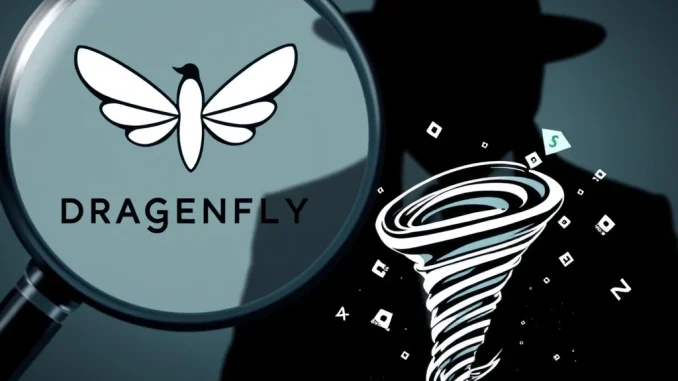
The cryptocurrency world is abuzz with the latest news: Dragonfly Capital, a prominent venture capital firm known for its blockchain and crypto investments, is now under the microscope of U.S. prosecutors. At the heart of this intense scrutiny is a 2020 investment in PepperSec, the developer behind Tornado Cash. This development signals a significant escalation in the government’s efforts to hold investors accountable for indirect ties to activities deemed illicit, especially those involving sanctioned entities.
Unpacking the DOJ’s Scrutiny on Dragonfly Capital
U.S. prosecutors are currently reviewing Dragonfly Capital’s 2020 investment in PepperSec, the entity responsible for the controversial decentralized mixer, Tornado Cash. This probe comes after the U.S. Department of the Treasury designated Tornado Cash as a sanctioned entity in August 2022. While no formal charges have been filed against Dragonfly Capital, the Department of Justice (DOJ) is clearly signaling a broader effort to expand the reach of its enforcement actions within the crypto space.
Dragonfly’s managing partner, Haseeb Qureshi, has publicly defended the firm’s position, asserting that the investment was made in good faith. He emphasized that legal assurances of compliance were obtained at the time, and no regulatory red flags were identified. Qureshi stated, “We made this investment because we believe in the importance of open-source privacy-preserving technology.” The firm is preparing to vigorously push back if formal charges are indeed brought.
The Tornado Cash Conundrum: Privacy vs. Illicit Use
At its core, Tornado Cash was designed as a privacy-enhancing tool, allowing users to obscure the origin and destination of their crypto transactions. However, its utility was unfortunately exploited by malicious actors, including hackers and sanctioned entities, seeking to hide their digital footprints. This dual nature has placed it squarely in the crosshairs of regulators.
The U.S. government’s crackdown on Tornado Cash intensified in 2023, leading to money laundering and sanctions violation charges against developers Roman Storm and Roman Semenov. Storm’s trial is currently underway in New York, and prosecutors have even hinted at the possibility of Dragonfly Capital facing similar action. Qureshi has dismissed these suggestions as intimidation tactics, arguing that the government’s court strategies are aimed at undermining Tornado Cash’s defense rather than targeting legitimate investors.
Navigating the Complexities of the DOJ Crypto Probe
Legal analysts are closely watching this situation, describing it as a “test of regulatory reach.” This case could set a significant precedent for how regulators approach decentralized projects, especially those where investors lack direct control over day-to-day operations. An anonymous compliance expert highlighted that the DOJ appears to be prioritizing anti-money laundering (AML) compliance over privacy-centric innovations, a notable shift observed across the industry.
Despite the sanctions and legal battles, Tornado Cash has shown surprising resilience. Flipside Crypto reported a staggering $1.9 billion in deposits through the platform in the first half of 2024, indicating a continued demand for anonymity tools in blockchain transactions. Furthermore, a developer known as Gunboats recently ported Tornado Cash to the MegaETH blockchain’s public testnet, citing the U.S. Treasury’s removal of some Tornado Cash addresses from the OFAC sanctions list earlier this year as inspiration.
Implications for Crypto Sanctions and Investor Accountability
Dragonfly Capital’s defense strategy will likely center on demonstrating its adherence to existing regulations at the time of its 2020 investment. The firm has chosen to limit public commentary due to the complexity of the matter, focusing instead on preparing a robust legal response. This situation has sent ripples through the broader crypto industry, prompting institutional investors to exercise increased caution due to compliance uncertainties.
The case has ignited widespread debates about risk management and due diligence practices within the blockchain sector. Many venture capitalists are calling this a “pivotal moment” for navigating evolving regulatory frameworks. The outcome could significantly influence how regulators handle similar cases, particularly those involving open-source tools with decentralized governance structures. This ongoing DOJ crypto probe underscores a strategic push to tighten oversight of decentralized technologies, even when investors do not exert direct control over project activities.
Shaping the Future of Blockchain Regulation
The actions taken by the DOJ against entities connected to Tornado Cash, and now potentially Dragonfly Capital, reflect a broader regulatory shift. This isn’t just about one firm or one protocol; it’s about defining the boundaries of responsibility in a rapidly evolving technological landscape. Haseeb Qureshi has argued that bringing charges against Dragonfly would set a problematic precedent for crypto investors, potentially stifling innovation in privacy-focused technologies that could otherwise have legitimate uses.
The implications extend beyond just venture capital firms. This case will undoubtedly influence how future blockchain regulation is shaped, impacting everything from decentralized finance (DeFi) protocols to new privacy solutions. It emphasizes the critical need for comprehensive legal counsel and robust compliance frameworks for all participants in the crypto ecosystem. As the trial of Roman Storm continues and the DOJ’s review of Dragonfly Capital progresses, the industry watches with bated breath, understanding that the rulings here will help chart the course for blockchain innovation and regulation for years to come.
Frequently Asked Questions (FAQs)
Q1: Why is the DOJ investigating Dragonfly Capital?
A1: The DOJ is probing Dragonfly Capital’s 2020 investment in PepperSec, the developer of Tornado Cash. This investigation stems from Tornado Cash being designated as a sanctioned entity by the U.S. Treasury in August 2022, due to its use by hackers and sanctioned entities for illicit financial activities.
Q2: What is Tornado Cash and why is it controversial?
A2: Tornado Cash is a decentralized cryptocurrency mixer designed to enhance transaction privacy by obscuring the origin and destination of funds. It became controversial because, despite its privacy intentions, it was widely used by cybercriminals and sanctioned groups to launder illicit funds and hide their digital footprints.
Q3: Has Dragonfly Capital been formally charged?
A3: No, Dragonfly Capital has not been formally charged. The DOJ’s actions are currently a “review” or “probe.” The firm has stated it will vigorously defend itself if charges are filed, asserting its investment was made in good faith with legal compliance assurances at the time.
Q4: How might this case impact the broader crypto industry?
A4: This case is seen as a “test of regulatory reach” and could set a significant precedent for investor accountability in decentralized projects. It highlights the increasing focus on AML compliance, may deter institutional investors due to compliance uncertainties, and could influence future blockchain regulation, particularly concerning open-source and privacy-focused technologies.
Q5: What is Dragonfly Capital’s defense?
A5: Dragonfly Capital’s defense centers on demonstrating that its 2020 investment adhered to all existing regulations at that time. Managing partner Haseeb Qureshi emphasized that legal counsel found no regulatory red flags, and the firm believes in supporting open-source privacy-preserving technology.
Q6: Why is Tornado Cash still seeing activity despite sanctions?
A6: Despite sanctions and legal challenges, Tornado Cash continues to see significant deposits, indicating ongoing demand for anonymity tools. This resilience is partly due to its decentralized nature and recent developments like a developer porting it to the MegaETH blockchain’s public testnet, citing the removal of some addresses from the OFAC sanctions list.



